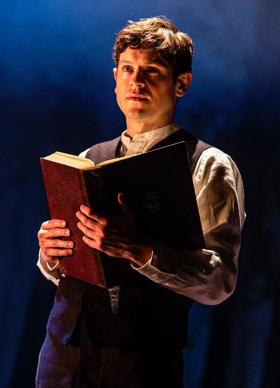Review: FOXFINDER, Ambassadors Theatre
![]() The English countryside in crisis, a couple grieving their son, and the fox as the deadly enemy of man. First performed to critical acclaim in 2011 at the Finborough Theatre, Dawn King's darkly compelling, dystopian play Foxhunter comes to the West End in a rather disappointing revival, lacking sufficient tension or drama.
The English countryside in crisis, a couple grieving their son, and the fox as the deadly enemy of man. First performed to critical acclaim in 2011 at the Finborough Theatre, Dawn King's darkly compelling, dystopian play Foxhunter comes to the West End in a rather disappointing revival, lacking sufficient tension or drama.
Samuel and Judith Covey are farmers battling against both failing crops and their own grief following the loss of their young son. In these troubling times, they find themselves under investigation by William Bloor, a dedicated 'Foxfinder', trained to hunt out the fox with almost religious zeal. Bloor's fixation on the fox as the root of all man's troubles leads to manipulation, guilt and ultimate retribution.
 On the surface, the revival of this play is an inspired decision: conspiracy theories and fake news abound, which seems timely. Unfortunately, the reality is underwhelming.
On the surface, the revival of this play is an inspired decision: conspiracy theories and fake news abound, which seems timely. Unfortunately, the reality is underwhelming.
A starry cast of four will be an audience draw, but often feel flat. Olivier Award-winner Iwan Rheon, best known for his role in Games of Thrones, takes on the tricky role of Bloor. He is a pale and calculating presence, but fails to bring out the vulnerable side of the character enough, perhaps because Rheon is simply too old to be playing a teenager.
The self-flagellation that he turns to in his sexual frustration is neither shocking, nor convincing, and overall he is just not menacing enough.
Poldark star Heida Reed plays Samuel's wife Judith; her emotional repression makes her feel too neutral. There is not enough sadness when speaking about her son and his untimely death, and there is not enough desperation when pleading with Bloor for her and her husband's future.
Bryony Hannah, probably best known for her role in Call the Midwife, plays neighbour Sarah. The character is rather forgettable, but when Bloor confronts her about supplying Judith with 'pro-fox' propaganda, she is visibly shaken and her betrayal of Judith and Samuel is very convincing.
Paul Nicholls, however, is excellent as the haunted Samuel; desperate with grief for his son, his face is etched with strain. As he becomes persuaded of the existence of foxes on his land by Bloor, he physically changes, with eyes bulging as he storms across the stage in pursuit of his imagined foe.
One of the reasons this play worked so well at the Finborough was the tiny space of the theatre and so the claustrophobia of the story was much easier to feel. Director Rachel O'Riordan, who has just been appointed the Lyric Theatre's new Artistic Director and Joint Chief Executive, tries to mount the tension, but the eeriness of the play is lost in the space of the theatre itself.
The look of the production is perfectly judged; Paul Anderson's haunting lighting complements Gary McCann's clever and sparse design, which melds the outside into the inside of the farmhouse. Threatening, silhouetted trees tower in the background and one encroaches into the house itself through the floor. However, the outside scenes that are staged in front of a painted forest screen look hemmed in and unconvincing.
Ultimately, this production of Foxfinder is frustrating; it has much potential, but it is lacking in the elements of tension and apprehension that are crucial to its success.
Foxfinder is at the Ambassadors Theatre until 5 January 2019
Photo Credit: Pamela Raith
Reader Reviews


